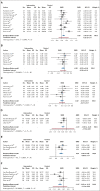Electronic Health Interventions for Patients With Breast Cancer: Systematic Review and Meta-Analyses
- PMID: 35500200
- PMCID: PMC9273371
- DOI: 10.1200/JCO.21.01171
Electronic Health Interventions for Patients With Breast Cancer: Systematic Review and Meta-Analyses
Abstract
Purpose: Ongoing supportive care using electronic health (eHealth) interventions has the potential to provide remote support and improve health outcomes for patients with breast cancer. This study aimed to evaluate the effectiveness of eHealth interventions on patient-reported outcomes (quality of life [QOL], self-efficacy, and mental or physical health) for patients during and after breast cancer treatment and patient-reported experience measures (acceptability and engagement).
Methods: Systematic review with meta-analyses (random-effects model) of randomized controlled trials was conducted following Preferred Reporting Items for Systematic Reviews and Meta-Analysis guidelines. Nine databases were searched using a prespecified search strategy. Patient-directed eHealth interventions for adult patients during or after active breast cancer treatment measuring QOL, self-efficacy, and mental (depressive, anxiety, and distress symptoms) or physical (physical activity, nutrition, and fatigue) health outcomes were included. Data from eligible full-text articles were independently extracted by six observers.
Results: Thirty-two unique studies (4,790 patients) were included. All were health self-management interventions, and most were multicomponent (videos, forums, and electronic reminder systems) websites. Meta-analyses revealed a significant effect of eHealth interventions on QOL (standardized mean difference [SMD], 0.20 [95% CI, 0.03 to 0.36]), self-efficacy (SMD, 0.45 [95% CI, 0.24 to 0.65]), distress (SMD, -0.41 [95% CI,-0.63 to -0.20]), and fatigue (SMD, -0.37 [95% CI, -0.61 to -0.13]). Twenty-five studies (78.1%) measured patient-reported experience measures. Acceptability (n = 9) was high, with high ratings for satisfaction (range, 71%-100%), usefulness (range, 71%-95%), and ease-of-use (range, 73%-92%). Engagement (n = 25) decreased over time, but disease-focused information and interactive support were most engaging.
Conclusion: eHealth interventions may provide an acceptable and effective strategy for improving QOL, distress, self-efficacy, and fatigue among patients with breast cancer.
Conflict of interest statement
Figures



Comment in
-
Systematic Review on Electronic Health Interventions for Patients With Breast Cancer: Revisiting the Methodology.J Clin Oncol. 2023 Jan 1;41(1):143-144. doi: 10.1200/JCO.22.01061. Epub 2022 Sep 19. J Clin Oncol. 2023. PMID: 36122308 No abstract available.
References
-
- Bray F, Ferlay J, Soerjomataram I, et al. : Global cancer statistics 2018: GLOBOCAN estimates of incidence and mortality worldwide for 36 cancers in 185 countries. CA Cancer J Clin 68:394-424, 2018 - PubMed
-
- Fiszer C, Dolbeault S, Sultan S, et al. : Prevalence, intensity, and predictors of the supportive care needs of women diagnosed with breast cancer: A systematic review. Psychooncology 23:361-374, 2014 - PubMed
-
- Ganz PA, Yip CH, Gralow JR, et al. : Supportive care after curative treatment for breast cancer (survivorship care): Resource allocations in low- and middle-income countries. A Breast Health Global Initiative 2013 consensus statement. Breast 22:606-615, 2013 - PubMed
-
- Mols F, Vingerhoets AJJM, Coebergh JW, et al. : Quality of life among long-term breast cancer survivors: A systematic review. Eur J Cancer 41:2613-2619, 2005 - PubMed
-
- Miedema B, Easley J: Barriers to rehabilitative care for young breast cancer survivors: A qualitative understanding. Support Care Cancer 20:1193-1201, 2012 - PubMed
Publication types
MeSH terms
LinkOut - more resources
Full Text Sources
Medical

